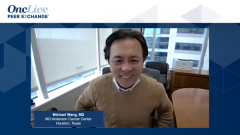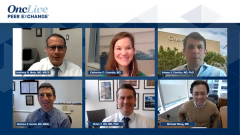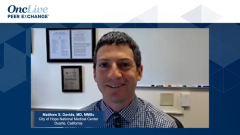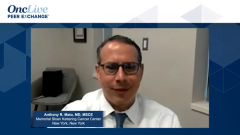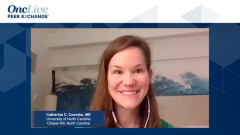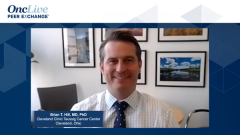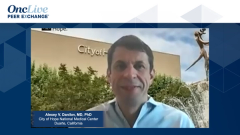
Emerging Approaches in CLL
The faculty members share expert insights into treatment approaches for patients with double-refractory chronic lymphocytic leukemia.
Episodes in this series

Anthony R. Mato, MD, MSCE: Callie, I want to jump into another section today and talk about the emerging problems and the emerging agents that may soon be available on the market to address those issues [for] patients. We partnered at the 2022 ASH (American Society of Hematology) Annual Meeting & Exposition to talk about these patients who have been doubly exposed to BTK (Bruton tyrosine kinase) inhibitors and BCL2 inhibitors. This is an area where the clinical trials have been lacking, because it's hard to define this population. Number 1, can you define this term double-refractory for us? [This] is a term that's being thrown around a lot. And [could you] comment on available options for these patients? How do you fit this into the world of unmet needs for our patients?
Catherine C. Coombs, MD: Yes, double-refractory CLL is generally defined as a disease with patients who have been failed by both a covalent BTK inhibitor and venetoclax. This definitely represents 1 of the major areas of unmet need in CLL, primarily because our standard-of-care options for these patients do not work very well. Some options that might be considered in the standard-of-care setting include PI3K inhibitors. The big problem with them, in addition to their toxicity, is that the prospective data that led to approval of agents like idelalisib and duvelisib excluded patients with prior TKI (tyrosine kinase inhibitor) treatment, and they were largely developed prior to the availability of venetoclax.
When using real-world data, we have seen that the PFS (progression-free survival) in patients who had been exposed to these agents that then go on to get PI3K is very dismal. The PFS is 4 or 5 months. This has similarly been looked at in the setting of chemoimmunotherapy, which also performs very dismally with a very similar PFS on the order of just a few months for these patients. This is where I think some of the novel agents can really help our patients. I would say the 2 classes of drugs that have the most robust data are pirtobrutinib, which, based on your presentation at ASH in December 2021, demonstrated a PFS of 18 months for these patients who are double-refractory, but it may even be better than that for patients in their third line. [In] the data from the BRUIN trial (NCT03740529), the subset of patients who were double-refractory—many failed by both a prior covalent and failed by venetoclax—they actually had 5 median lines of prior therapy. In the modern CLL era, where we're seeing a lot less chemoimmunotherapy for earlier lines of therapy, maybe we'll even see a better response rate. The other class that I'm particularly excited about is CAR (chimeric antigen receptor) T cells, [but] I'm sure we'll speak about these more later. That's another area that [City of Hope CLL Program Director] Tanya Siddiqi, MD's publication [in] Blood showed a very meaningful PFS benefit in the patients [with] double-refractory [disease]; I think on the order of 13 months.
Anthony R. Mato, MD, MSCE: The other area where there's been some data generated in the real-world setting is retreatment with venetoclax. This is an area where we don't have prospective data, but I'll give Matt the chance to plug his clinical trial in a second. We do have retrospective data that's becoming more and more robust. I feel like this is one of those areas where the real-world data will be a couple of years ahead of the trials, but [it] will probably tell us some of the answers in advance. The German CLL Study Group had some data presented at the EHA (European Hematology Association) [2022 Congress] that looked quite encouraging for the use of venetoclax following a venetoclax-based regimen going from frontline to first relapse. Our group did a real-world project with Meghan Thompson, MD, at Memorial Sloan Kettering [Cancer Center] at many other centers where she demonstrated in heavily pretreated patients that venetoclax worked again in about 72% of patients. Then John Seymour, [MBBS, PhD, of the Peter MacCallum Cancer Centre and Royal Melbourne Hospital, Australia], utilized some of the MURANO [trial] (NCT02005471) data to show exactly the same findings.
My question to you, Matt, is [this]: even in these early venetoclax progressors, these would not be the ideal candidates for your trial because most of them are progressing relatively quickly, venetoclax works again, and we'll publish data soon to show the responses are durable. Can you comment on optimal timing for venetoclax retreatment and what you hope to achieve with the ReVenG trial?
Matthew S. Davids, MD, MMSc: I'm curious to see your data because I think the durability of response is really a key unanswered question right now. I agree with you that the real-world data is going to be very informative on that question first—before we get the results of our prospective trial. Just briefly, the ReVenG trial (NCT04895436) is retreatment with venetoclax-G or venetoclax/obinutuzumab. This is a collaboration between ourselves, Dana Farber [Cancer Institute], and the German CLL Study Group with AbbVie. The idea is basically [that if] patients who had venetoclax/obinutuzumab as frontline therapy had at least 1 year of remission, they can be retreated with an additional treatment of venetoclax/obinutuzumab. Actually, if it's just 1 to 2 years of remission, they can get a longer course of venetoclax-based therapy. If they had more than 2 years of remission, they just get the standard 1 year of venetoclax/obinutuzumab. We're going to look at overall response rate as the primary end point, but we also, of course, hope to look at the durability of this. I'm quite optimistic based on the real-world data that we've seen already, with about 75% of patients responding in a more refractory group, so in this frontline population, I think the response rates will be even higher and hopefully durable.
Transcript has been edited for clarity.


